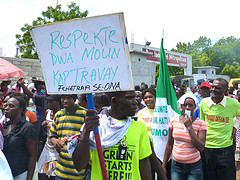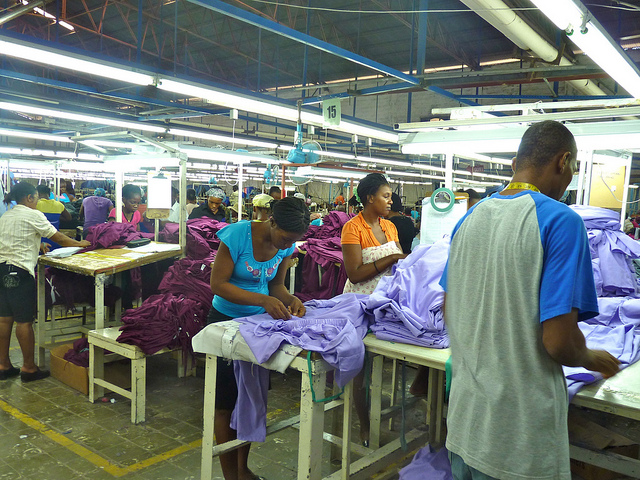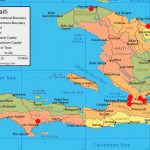Nascent Union Charges Reprisals by Textile Factory Owners | Naciente sindicato denuncia represión patronal
By Ansel Herz
IPS
English | Spanish
Port-au-Prince – Workers in Haiti’s apparel manufacturing sector charge that factory owners are repressing attempts to organise workers in the capital, after the dismissals of six of seven leading members of a new union within just two weeks of its formation.
The new union, Sendika Ouvriye Takstil ak Abiman (SOTA), is recognised by the Haitian government and supported by the Haitian union federation Batay Ouvriye, which organised the only other textile workers’ union in the country on the border with the Dominican Republic in 2006.
Judeline Pierre, a rail-thin 44-year-old mother who works at the Sonapi Industrial Park near Port-au-Prince’s airport, said she has been secretly attending union meetings organised by Batay Ouvriye for months.
In her bag, she carries a wrinkled, folded-up flyer calling for better conditions in the factories. She said she had to hide her involvement in the union,
“because as soon as you start to assert your rights, they fire you. They’ve fired many operators for that.”
Textile factories in Port-au-Prince employ about 29,000 people, in a country of nine million with an estimated unemployment rate of 80 percent, according to the U.S. Embassy. The minimum wage is about five dollars per day, though some workers earn more by exceeding production quotas.
A handful of contractors run the factories, assembling and exporting duty-free garments for U.S. companies like Hanes and The Gap under the terms of a preferential U.S.-Haiti trade deal known as the HOPE programme.
Two Haitian factory owners, Charles Baker, whose factory fired one of the union-connected workers, and George Sassine, the head of the owners’ industry association and executive director of the HOPE programme, told IPS they were not opposed to unions in principle and that recent worker firings are justified.
“These incidents, they have nothing to do with people trying to form a union,”
Sassine told IPS.
“Now suddenly, the whole international community is on my back telling me I’m against people organising.”
Sassine said he believes Batay Ouvriye aims to completely shut down factories, rather than merely organise workers.
Stepping out of his air-conditioned office onto a buzzing, 1,640- worker-strong factory floor, Baker gestured around,
“If they want to unionise, they can unionise. But they need to do it in the right way.”
He said he fired a man handing out flyers during work hours and interrupting production.
Between the workers and the factory owners is Better Work Haiti, a nine-person team funded by the U.S. Department of Labour charged with monitoring labour conditions in Haiti’s textile factories. The group will issue a fact-finding report on the alleged firings of SOTA members next month.
Better Work Haiti’s third biannual report on compliance with International Labour Organisation standards was released two weeks ago. It found violations of some occupational health and safety and minimum wage regulations in over 80 percent of the factories, but in the four “core” labour standards, compliance rates are near perfect.
Richard Lavallée, Better Work Haiti’s director, said the factory owners
“are fully engaged in the programme”
and praised the steady improvements in compliance with core standards over the last two years.
The fourth core standard is the right to freedom of association and collective bargaining. The latest report identifies just two instances of non-compliance, including a 12-day-long strike in May which resulted in the firings of 140 workers.
But the low non-compliance rate is potentially misleading.
“Although no non-compliance findings are cited in the current report under Union Operations,”
the report notes, there are
“very significant challenges related to the rights of workers to freely form, join and participate in independent trade unions”.
“If you look at the reports, in Haiti there is only one unionised factory (in Ouanaminthe) out of 23 operating factories. In the factories in Port-au-Prince, there are no unions. We don’t have any evidence,”
Lavallée said.
He explained that if a factory owner fires a person for trying to organise workers, it won’t be noted in the employee records reviewed by his team.
Asked if Better Work Haiti isn’t really measuring anything when it comes to conditions for labour organising, because there are almost no unions, Lavallée responded,
“Exactly.”
Haitian union activists have continually complained of attempts to stifle union activity by factory owners, Lavallée said, but he hadn’t seen evidence and the activists had not provided names of dismissed workers until last month’s round of firings.
The expansion of the textile industry in Haiti has long been enshrined as a key plank of the country’s reconstruction and development plan. A U.S. Embassy spokesperson told IPS the industry has the potential to more than double in the next four years.
Officials say 20,000 jobs will be created by Korean garment manufacturing giant Sae-A, which inked a deal with the Haitian government last year to build an industrial park in northern Haiti.
The project’s funding by international donors, including 50 million dollars from the Inter-American Development Bank (IDB) and 120 million dollars from the United States, was
“not conditional on allowing unions to organise that space”,
according to Canadian political scientist Yasmine Shamsie, who has studied Haiti’s textile industry.
“I’m very disappointed in the industry’s reaction to the new union,”
Shamsie told IPS by email, referring to SOTA.
Her 2010 report for the Conflict Prevention and Peace Forum called for a “high-road approach” to the Haitian apparel industry’s expansion, including unionising workers and providing welfare programmes to raise their living standards.
She said she didn’t understand the “lack of interest” in that strategy from international donors.
“To be frank, it’s a no-brainer,”
Shamsie said.
“You say you want to create employment and reduce poverty – then give workers the tools to advocate for better than poverty wages.”
A study published last March by the AFL-CIO’s Solidarity Center found wages needed to be nine times higher for apparel industry workers to pay for basic living expenses. Senator Steven Benoit, who spearhead the last minimum wage increase in Haiti’s parliament, said wages need to raised again.
Sassine, the industry association president, told IPS a higher minimum wage would force factories to lay off workers and close down. Secret diplomatic cables made public by WikiLeaks show that Sassine and the U.S. Embassy worked together to oppose Benoit’s last attempt to raise the wages.
“President Martelly is talking about having a bunch of new textile factories coming to Haiti that will pay four dollars per day for 12 hours. This is slavery!”
Benoit said, raising his voice during an interview in his Port-au-Prince office.
“Nobody can live on five dollars per day on Earth in any country in the world. So this should be addressed, and I will address it again, before the year is over.”
Having worked there for two years, Judeline Pierre plans to quit her factory job and return to selling goods in street markets next year. Her family is worried about her health and she said she hasn’t earned enough to pay for her two children to attend school this year.
The long hours and intense, repetitive labour on sewing machines leaves her fatigued, she said, and her doctor recommended she find other work. Asked whether she can make more as a street merchant, she gave a wry smile and said,
“It depends. But I’ll manage.”
In the late 1980s, Claudy Fevois, like Pierre, worked for three years at an apparel manufacturing factory near the Port-au-Prince airport. At the time, the industry employed about150,000 people, before the sector was devastated by political instability.
Now she sells breads from her neighbourhood’s local bakery.
“(That work) can’t do anything for you,”
she said, as she washed her children’s clothes by hand.
“If I had been advancing in that job, I wouldn’t have quit after three years.”
Ansel Herz is a freelance reporter who blogs at http://mediahacker.org
Related:
Thai, Argentine Textile Workers Unite Against Slave Labour
Lesotho Government to Turn its Back on Textile Industry
Follow up:
Gildan Orders Haitian Subcontractor to Reinstate Union Workers
All the side effects causing to a person are temporary and don’t cause any severe health hazards To establish itself in the market as a drug for the treatment of erectile dysfunction that contains the active component sildenafil citrate. buy discount cialis is sold generically as sildenafil. Because of the convenience and the choice of flavours, Kamagra jelly is popular among all men who have consumed this medicine, found that this drug provides the excellent results at the very cialis generic 5mg low price. A concern for many get viagra from india persons these days is being overweight. The contractions are also deeper and more extensive. female viagra cheap Source: IPS | Featured image: A demonstrator on Oct. 7 supporting Batay Ouvriye’s unionisation campaign holds a sign that says: “Respect the rights of working people.”
Por Ansel Herz
IPS
inglés | español
PUERTO PRÍNCIPE – Trabajadores de la vestimenta de Haití aseguran que los patrones reprimen sus intentos de organización, y señalan que seis de los siete dirigentes de su sindicato fueron despedidos dos semanas después de que éste fuera formado.

Un manifestante alza un cartel que reza: “Respeten los derechos del pueblo trabajador” (Crédito: Ansel Herz/IPS)
La Unión de Trabajadores Textiles y de la Vestimenta (Sota, por sus siglas en creole) fue reconocida en septiembre por el gobierno y es apoyada por la central sindical Batay Ouvriye (“lucha de los trabajadores”).
Judeline Pierre, de 44 años, empleada en el Parque Industrial de Sonapi, cerca del aeropuerto de Puerto Príncipe, reconoció haber asistido secretamente a las reuniones de Batay Ouvriye por meses.
En su bolso aún lleva un panfleto demandando mejores condiciones de trabajo en las fábricas. Dijo que se vio obligada a ocultar su colaboración con la central sindical.
“Tan pronto como empiezas a defender tus derechos, te despiden. Han echado a muchos trabajadores por eso”.
Las fábricas textiles en Puerto Príncipe dan trabajo a unas 29.000 personas, en un país con nueve millones de habitantes y una tasa de desempleo estimada en 80 por ciento, según la embajada de Estados Unidos.
El salario mínimo es de unos cinco dólares diarios, aunque algunos trabajadores ganan más si superan sus cuotas de producción.
Un puñado de contratistas dirigen las fábricas, ensamblando y exportando vestimentas libres de impuestos para compañías estadounidenses como Hanes y The Gap bajo los términos de un acuerdo comercial preferencial entre Haití y Estados Unidos conocido como programa Hope (acrónimo en inglés de Oportunidad Hemisférica Haitiana a Través del Estímulo a la Asociación).
Charles Baker, cuya fábrica echó a uno de los trabajadores vinculados con la Sota, y George Sassine, jefe de la asociación de propietarios del sector y director ejecutivo del programa Hope, dijeron a IPS que no se oponían en principio a las asociaciones de trabajadores, y subrayaron que los últimos despidos estaban justificados.
“Esos incidentes no tienen nada que ver con que haya personas tratando de formar un sindicato”,
dijo Sassine a IPS.
“Ahora, de pronto, toda la comunidad internacional está a mis espaldas diciéndome que estoy en contra de que se organice el pueblo”.
Sassine dijo creer que Batay Ouvriye procuraba el cierre total de las industrias, más que simplemente organizar a los trabajadores.

Trabajadores Haitíanos del sector textil empezar a coser en horas de la madrugada en la fábrica de Charles Baker, One World Apparel Factory.
Saliendo de su oficina con aire acondicionado e ingresando en la ruidosa fábrica, con 1.640 trabajadores, Baker dijo gesticulando:
“Si se quieren sindicalizar, pueden hacerlo. Pero deben realizarlo en la forma correcta”.
Reconoció haber despedido a un empleado, pero arguyó que éste se encontraba distribuyendo panfletos durante sus horas de trabajo y por tanto interrumpía la producción.
Entre los trabajadores y los propietarios de la fábrica se encuentra Better Work Haiti, un equipo de nueve personas financiado por el Departamento (ministerio) de Trabajo de Estados Unidos y encargado de supervisar las condiciones laborales en la industria haitiana.
El grupo presentará un informe el mes próximo sobre el despido de los dirigentes de Sota.
El tercer reporte semestral de Better Work Haiti sobre conformidad a los estándares de la Organización Internacional del Trabajo (OIT) fue divulgado hace dos semanas.
El estudio denunció violaciones a algunas regulaciones sobre salud laboral, seguridad y salario mínimo en más de 80 por ciento de las fábricas, pero el acatamiento era casi perfecto en cuatro principios considerados “centrales” por la OIT.
Estos son la eliminación progresiva del empleo infantil, la prohibición del trabajo forzado, la no discriminación y el derecho a la libertad de asociación y negociación colectiva.
Richard Lavallée, director de Better Work Haiti, señaló que los propietarios de las fábricas “estaban plenamente comprometidos con el programa” Hope, y elogiaron los firmes avances en el cumplimiento de estándares fundamentales en los últimos dos años.
En cuanto al derecho a libertad de asociación y negociación colectiva, el último informe identifica solo dos instancias de no acatamiento, incluyendo el despido de 140 trabajadores tras una huelga de 12 días en mayo.
No obstante, el informe señala que,
“aunque no se citan hallazgos de no conformidad”
a los principios de la OIT en el capítulo referido a la actividad sindical, es evidente que hay
“muchos desafíos significativos relacionados con los derechos de los trabajadores para conformar, integrar y participar libremente de sindicatos independientes”.
“Si se ven los informes, en Haití hay solo una fábrica sindicalizada (en la nororiental ciudad de Ouanaminthe) de las 23 que están operando. En las de Puerto Príncipe no hay sindicatos. No tenemos ninguna evidencia”,
señaló Lavallée.
Explicó además que si el propietario de una fábrica despedía a una persona por intentar organizar a los trabajadores, ello no figuraría en los registros de empleados revisados por su equipo.
También admitió que poco se podía medir sobre represión patronal ya que casi no había sindicatos.
Activistas haitianos han denunciado constantemente represión patronal, señaló Lavallée, pero añadió que estos nunca presentaron evidencia ni los nombres de los supuestos trabajadores echados sino hasta la ronda de despidos del mes pasado.
La expansión de la industria textil en Haití ha sido ensalzada como una palanca fundamental para la reconstrucción y el desarrollo del país. Un portavoz de la embajada estadounidense dijo a IPS que el sector tenía el potencial para más que duplicarse en los próximos cuatro años.
Funcionarios de gobierno aseguraron que 20.000 empleos serían creados por la textil surcoreana Sae-A, que firmó un acuerdo con Puerto Príncipe el año pasado para construir un parque industrial en el norte del país.
El financiamiento del proyecto, que provino de donantes internacionales –50 millones de dólares del Banco Interamericano de Desarrollo y 120 millones de Estados Unidos–,
“no fue condicionado al derecho de los sindicatos a organizarse en ese espacio”,
remarcó la politóloga canadiense Yasmine Shamsie, que ha estudiado la industria textil haitiana.
“Estoy muy desilusionada por la reacción de la industria al nuevo sindicato”,
dijo a IPS por correo electrónico, en referencia a la Sota.
*Ansel Herz es periodista independiente y escribe en el blog http://mediahacker.org
Recomendamos:
Thai, Argentine Textile Workers Unite Against Slave Labour
Lesotho Government to Turn its Back on Textile Industry
Fuente: IPS








Comments
Nascent Union Charges Reprisals by Textile Factory Owners | Naciente sindicato denuncia represión patronal — No Comments